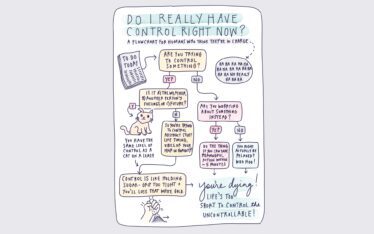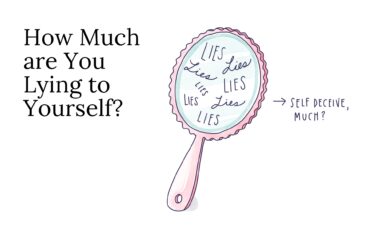With Thanksgiving on the horizon, I’m feeling a wee bit petulant about All Things Gratitude. Is it because I’m a spoiled ingrate? No! (I mean, mostly no!) (Okay fine, I take mostly everything in my life for granted. But that’s not why I’m giving gratitude the side-eye.)
I’m worried that amidst the ubiquity of said topic this time ‘o year, you’ve got a moderate-to-severe case of gratitude fatigue.
So in an effort to NOT bore you to tears (or death) with all the gratitude research and BuzzFeed listicles you’ve already consumed, I’m going to razzle-dazzle you with the lesser-known facts and stats and musings about “the reason for the season.” 👈 To be clear: pecan pie really isn’t supposed to be the reason for the season. You guessed it … it’s glitter-covered gratitude!
Let’s open the Cabinet of Gratitude Curiosities
You already know that gratitude leads to better mental health, well-being, subjective life satisfaction, and shinier hair. Here are 17 facts that might not have come across your radar …
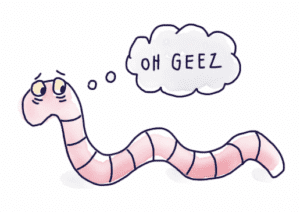 Gratitude makes us obedient.
Gratitude makes us obedient.
This recent gratitude study found that “participants who were induced to feel gratitude obeyed to a greater extent a command to grind worms in a grinder than those feeling neutral.”
You read that right.
Researchers discovered that “gratitude can make a person more vulnerable to social influence, including obeying commands to perform an ethically questionable act.” Oooh … positive psychology’s golden child has a dark side!
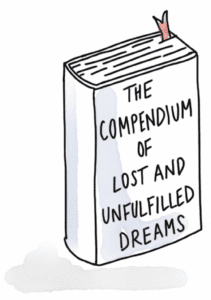 Gratitude reduces regret.
Gratitude reduces regret.
It’s no secret that my mission in life (other than making a decent gluten-free pecan pie one day) is to help us lead squander-free, regret-free lives—so this research tidbit is near and dear to my heart.
One of the best ways to reduce the “coulda shoulda woulda” pangs of regret is to sprinkle a little gratitude in the mix. Studies consistently show that “both dispositional and state gratitude could reduce regret in decision making.” Engaging in daily “here is what I am grateful for” reflections not only ameliorates the feeling of regret about your past stupid decisions, but protects you against feelings of regret for your future stupid decisions.
Gratitude makes us less likely to cheat.
Researchers demonstrate that gratitude reduces the likelihood of study participants to cheat in a laboratory setting and in an anonymous online setting. “While only 2% of grateful participants cheated in assigning tasks to themselves, fully 16% of happy or neutral participants cheated.” (Said differently, happiness makes us cheat.)
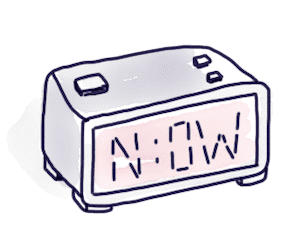 Gratitude makes us feel more present in the moment.
Gratitude makes us feel more present in the moment.
Let me guess: your monkey brain darts between thoughts of the past and future, but rarely spends time in the here and now. You know what helps with that? Sauvignon blanc! (JK— you know it’s gratitude. Doused in a glass of wine.) Researchers found that “gratitude played a mediating role between the dimensions of time perspective and life satisfaction.”
Gratitude can be all about Me, Myself, and I.
Researchers are expanding the concept of gratitude by encouraging us to look in the mirror and practice “self-gratitude.” Actively recognizing our own unique value, and reflecting on questions like, “I’m grateful toward myself for these fantabulous qualities …” can not only help us like ourselves better, but broaden the way we think about gratitude. We can appreciate who we are just as much as we can appreciate the good and great things that happen to us.
 Gratitude increases with prayer.
Gratitude increases with prayer.
Research studies have shown that “prayer plays a causal role in promoting gratitude,” possibly because of the repetitive and ritualistic nature associated with praying … which might allow for further reflection and thankfulness.
Gratitude kicks memory lane’s ass.
Study participants demonstrated higher levels of life satisfaction and self-esteem after a gratitude contemplation exercise, compared to a “describe a memorable event” exercise.
 Gratitude makes us less materialistic.
Gratitude makes us less materialistic.
The sense of importance we attach to our worldly possessions (the car! The house! The pony! The yellow diamonds! The retirement fund!) tends to diminish when we recognize, appreciate, and savor what we already have. (Sounds like a good time to hum Sheryl Crow’s “it’s not having what you want, it’s wanting what you’ve got” song. You with me?)
Gratitude’s impact is often underestimated.
Study participants who wrote gratitude letters “significantly underestimated how surprised recipients would be about why expressers were grateful, overestimated how awkward recipients would feel, and underestimated how positive recipients would feel.” We hold back on expressing appreciation to others because we think it will be awkward, while the opposite is true: we have the chance to make someone’s day when we tell them why we’re grateful for them. (For more fodder on how out to lunch we are with what’ll make us—and others—happy, check out Stumbling on Happiness by Dan Gilbert … ideally the audiobook to fully appreciate his full-on funniness.)
Gratitude goes hand in hand with corporate social responsibility (CSR) in the workplace.
Studies show that employees with feelings of gratitude have greater concerns for CSR and societal issues (and strangely no real sense of responsibility for economic and safety issues at work). Gratefulness ignites prosocial behavior … not so much on the profitability theme.
 Gratitude makes us less financially impatient.
Gratitude makes us less financially impatient.
Study participants who were primed to feel grateful evidenced greater patience in comparison to participants primed to feel happy or not primed for any emotion at all. “In monetary terms, the mean grateful participant required $63 immediately to forgo receiving $85 in three months, whereas the mean neutral or happy participant required only $55 immediately.” This is particularly useful information if you are in the hock to a loan shark.
Gratitude is relative to context.
Gratitude is linked to social judgment, which means that our degree of thankfulness for financial loans or help with a task is relative to how much each friend contributes. This study explains that we’re more grateful to the buddy who loans us the most money (as compared to the other cheapskate friends who cough up less money), and that we’re more appreciative of the friend who spends the most time helping us with a task (vs. the deadbeat friends who spend less time helping.) We really are awful.
Gratitude is squashed by narcissism and cynicism.
Researchers dug into the variables that might inhibit gratitude, and highlighted narcissism and cynicism as the “thieves of thankfulness.” Makes sense, right? Narcissists believe they are entitled to everything, so therefore have little to be grateful for. Cynics suspect ulterior motives exist behind any gift, which puts a perma-dent in gratitude. (Materialism and envy were also noted as slight gratitude dampeners in the study.)
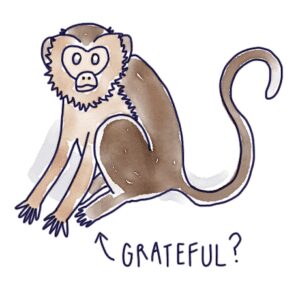 Gratitude might exist in animals.
Gratitude might exist in animals.
The evidence is clear that reciprocal relationships exist in the animal kingdom (like the food-for-grooming economy that apes engage in: “If you groom me this morning, and I come across food this afternoon, I’ll toss you a few leaves and branches, mkay?”). It’s not clear, however, whether animals experience the actual emotion of gratitude during these moments of cooperation/ reciprocal exchange. Animals do not appear to record what they are thankful for in gratitude journals, for example. The research continues.
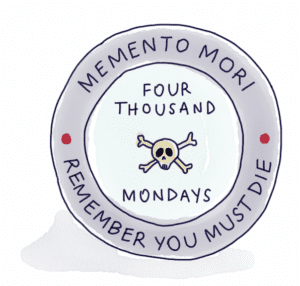 Gratitude boosts when we contemplate death.
Gratitude boosts when we contemplate death.
We spoke about this in depth here— the fact that mortality salience (fancy psychology term for “awareness that we’re gonna die”) wakes us up to the sanctity and scarcity of life.
Gratitude might come from Mom.
Research has shown that a mother’s level of gratitude has a positive statistical relationship with her child’s level of gratitude, while “father gratitude demonstrated a consistent pattern of no relationship with child gratitude.” Great news! Your thankless Dad won’t rub off on you!
Gratitude is a shapeshifter.
This magical potion is an emotion, a personality trait, a moral virtue, a mood, a habit, a motive, a noun, a verb, and a way of life. Spending time learning about it and contemplating it is time well spent on the path towards the good life.
A meta moment: appreciating gratitude
Is it too corny for me to encourage us to be grateful for gratitude? (Yes? Oh, okay.) Other than memento mori (death reflection), I know of no more powerful concept in positive psychology to help us live fulfilling lives. What a fabulous intervention at our fingertips to activate any place, any time.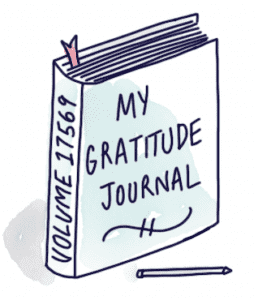
Is it also too corny for me to thank YOU for reading this? (Yes? Oh, okay. *Picture me dejectedly kicking the gravel*) But really: I am grateful that you read this until the end (and maybe more of my posts while you’re at it?). Writing is a lonely endeavor (pretty perfect for us introverts actually) so it helps to know I’m writing for more than just myself and my dear Dad who reads these posts every Monday like clockwork 😊. (Dad … I think I got my attitude of gratitude from you, despite research to the contrary.)

P.S.: You, me, Instagram. Let’s do it.
P.P.S.: Oh and just in case you missed it… I’d love you forever if you took 16 minutes out of your life to watch my TEDx talk!





